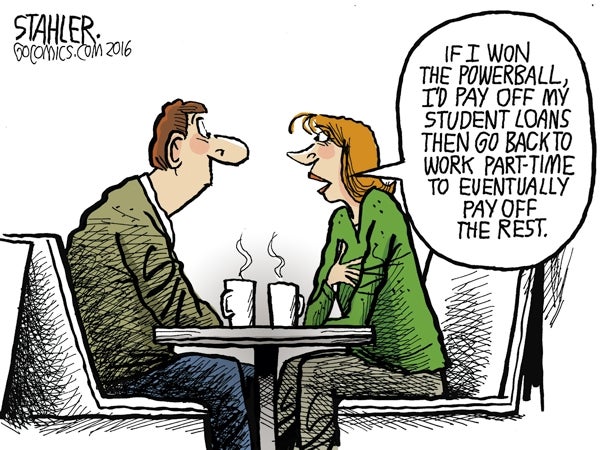Patrick Gannon: Powerball frenzy boosts NC revenues
Published 12:00 am Wednesday, January 13, 2016
RALEIGH — Fueled by a nearly $1 billion Powerball jackpot, Saturday, Jan. 8, set a single-day record for lottery ticket sales in North Carolina — a whopping $23.3 million.
Of that, hopeful players in the Tar Heel state spent $17.2 million on Powerball alone. That day shattered the previous record of $17.6 million in total lottery sales set on March 30, 2012, when a large Mega Millions jackpot brought players out in droves.
I have little doubt that by the time you read this, the new record will have been broken again. As of this writing, the Powerball jackpot for Wednesday, Jan. 13, stands at $1.4 billion, or $806 million cash.
That ridiculous number has millions of folks in dozens of Powerball states across the country dreaming of what they would do if they won.
Powerball tickets are sold in 44 states, plus Washington, D.C., Puerto Rico and the U.S. Virgin Islands. Three of my friends from across the country and I texted recently about what we would do if we won. Many of you have done the same.
This, in my opinion, is what’s good about lotteries. Powerball gives people a chance to escape — if just for a few moments — from everyday worries about paying bills, living paycheck to paycheck and wondering if they’ll have enough money to enjoy retirement.
The odds are minuscule — 1 in 292.2 million. According to one article, the odds are roughly the same as flipping a coin 28 times and having it land on heads every time.
This huge Powerball jackpot will help ensure that the N.C. Education Lottery generates as much or more revenue for educational purposes here as it budgeted by the end of this fiscal year, $528 million. From Nov. 7, when this Powerball jackpot stood at a measly $40 million, through Jan. 8, the state lottery reported $65 million in Powerball sales. That means this jackpot already has generated at least $25 million for education, or 76 cents for each $2 Powerball ticket.
As of this past weekend, driven in large part by this jackpot, Powerball sales in North Carolina were 72 percent above budget projections through this point in the fiscal year. Those increases will help offset games that aren’t performing as well as the lottery hoped and those that see a decline in sales because players are choosing Powerball instead.
In Powerball, about 50 percent of revenues go toward prizes. In addition to the money for education in North Carolina, 7 percent goes to retailers who sell the tickets.
“They’re another real beneficiary of what’s going on right now,” said lottery spokesman Van Denton.
About 4.5 percent goes to lottery administration.
Denton said the $1.3 billion jackpot also is important because it’s attracting new players, and the Education Lottery is still a relatively young game.
Plenty of people still want the lottery — which sold its first tickets in March 2006 and started selling Powerball tickets soon afterward — to go away. They cite poor odds and studies that show low-income residents spend more of their disposable income on gambling. They make good points, and I would never suggest that any person should spend too much of their hard-earned cash gambling. (Neither would lottery officials, by the way).
But this is one time that those arguments shouldn’t sway your decision on whether to play.
I bought three Powerball tickets for Wednesday’s drawing, spending $9, about the cost of two beers or a few gallons of gas. I placed the tickets near my front door so I’d see them each time I come and go.
For me, that’s money well-spent, a brief opportunity to consider a far different life for myself and my loved ones during an historic, record-breaking run for Powerball. And when I don’t win, a few dollars of that will find its way to the schools, where it is needed.
Patrick Gannon is a columnist for Capitol Press Association.


